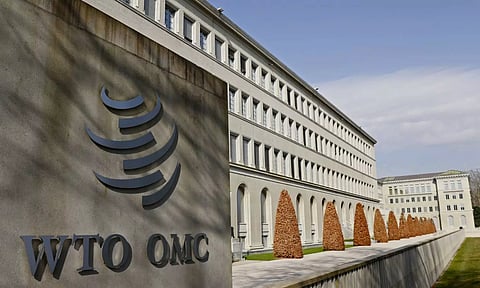

NEW DELHI: Reaching an agreement on food stockpile issue at the WTO meet next month is difficult as both developed and developing countries have diverse views on the matter, economic think tank GTRI said on Tuesday.
The Global Trade Research Initiative (GTRI) said that developed countries like the US argue that India's programme could distort trade.
The issue will figure in the 13th ministerial conference (MC 13) at Abu Dhabi from February 26-29. MC is the highest decision making body of the 164-member Geneva-based global trade body WTO.
"MC13 might not resolve the issue, showing the conflict between developing countries wanting to protect food security and developed countries pushing for free trade," the GTRI said in its report.
India's top priorities for the MC13 include securing a permanent solution for its public stockholding (PSH) programme.
This programme seeks flexibility in food procurement and pricing, crucial for India's food security needs.
The PSH programme is a policy tool under which the government procures crops like rice and wheat from farmers at minimum support price (MSP), and stores and distributes foodgrains to the poor, it said.
It added that through a programme called Pradhan Mantri Garib Kalyan Anna Yojana, India offers affordable rice and wheat to more than 800 million people, making it the biggest programme of its kind.
The report said that India stresses the need for PSH for its large, vulnerable population and wants a permanent solution from the MC13.
Food procurement, stockholding, and distribution are crucial to India's food security strategy.
India argued that finding a solution to PSH was a long-standing WTO mandate and should be prioritized at MC13.
India made it clear that it would not engage in other agriculture discussions until a permanent solution for PSH was reached.
"Reaching an agreement on PSH is difficult as developed countries like the US and the Cairns Group argue India's programme could distort trade," GTRI Co-Founder Ajay Srivastava said.
It further added that India wants its PSH programmes to explicitly categorized as 'Green Box' support as it would would provide legal assurance for implementing these programmes without breaching WTO limits on domestic support.
"India also wants a freedom to set minimum prices and procurement levels based on India's food security needs. This includes avoiding limitations based on a fixed percentage of production value or reference prices based on outdated data," the report said.
Besides, the country may also ask for a special safeguard mechanism (SSM) for imposing temporary import restrictions to protect local farmers in response to surges in imports or price declines.
This would protect domestic farmers and markets from unfair competition.
"India may also ask for separating PSH discussions from other agriculture negotiations at the WTO. This prevents developed countries from linking PSH concessions to trade-offs in other areas, such as market access," it said.